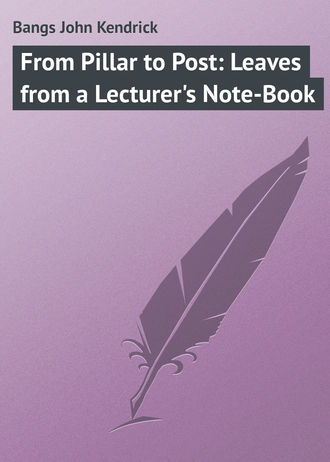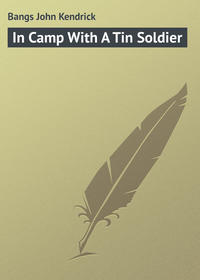 полная версия
полная версияFrom Pillar to Post: Leaves from a Lecturer's Note-Book
"Everything is beautifully green about here," I said. "It is a positive pleasure to look out on those lovely fields."
"Glad you like 'em," said the judge, helping himself to a generous mouthful of tobacco.
"Well, you see," said I, "I come from Maine, Judge, and I am particularly fond of the spring, and we don't get ours until late. I guess," I added, "that in respect to that we are about a month and a half behind you people down here."
"Yes," said he explosively, "and, by God! you are fifty years behind us in every other respect!"
It was a kindly and tactful remark, and I was duly edified. If he had said it smilingly, I should have been happier, and would have been inclined to enter upon a half-hour of jovial banter on the subject of the respective merits of our several States; but there was a truculent self-confidence about his honor's "atmosphere" that foreshadowed little in the way of a satisfactory issue had I ventured to carry the discussion further. I simply withdrew within myself, like a turtle, finished my cigar in silence, and returned to my seat in the chair car, convinced that in whatever line of action the judge was really an expert – law, history, economics, or what-not – he at least knew how to put a cork in a bottle, and jam it in so tight that nothing could get out of it – I being the bottle.
As I sat for the rest of my journey in that chair car my mind reverted to another incident that had occurred two months earlier. The inviting causes were similar; but the party of the second part was a very different sort of individual. The judge was said to be prosperous, the owner of many acres of fertile sugar land, and had, or so I was informed, a professional income of fifteen thousand dollars a year. One would think he could have afforded to be genial under such conditions. The other was a man bent and broken under the stress of his years and his trials, coming home, after a lifetime of failure, to pass his remaining days, manifestly few in number, amid the scenes of his youth. What few locks were left him were gray, and he limped painfully when he walked. He had served on the Confederate side during the war, and still carried with him the evidences of sacrifice.
I met him on the railway platform at a little junction town in Southern Tennessee. I was en route to a small college town in Upper Mississippi. We had had a long and tedious wait upon the fast decaying station platform, hoping almost against hope that at least day before yesterday's train would come along and pick us up, whatever might be the fate of the special combination of wheezy engine and spring-halted cars due that morning. As I nervously paced the dragging hours away I noticed this old fellow limping anxiously about, making over and over again of everybody he met the same inquiry as to the probable arrival or non-arrival of our train; and now and then he would hobble with difficulty over to a small soap box, with a slatted top, which stood just outside the baggage room, in which there was imprisoned a poor, shivering, and I fancy hungry, little fox terrier, whining to be let out.
"Never mind, Bobby," the old man would whisper through the slatted top of the box. "'Taint gwine to be much longer now. We'll be home soon."
The kindly attitude of the old man toward the unhappy little animal touched me more deeply than his own poverty-stricken condition, and so, yielding to a friendly impulse, I stood by him for a moment and spoke to him.
"It's a long wait," said I.
"Oh, well," he said cheerfully, straightening himself up stiffly, "it's so near the end I ain't complainin'. I been waitin' fohty yeahs for this, Brother."
"Forty years?" I repeated.
"Yes, suh," he replied, "fohty long yeahs, suh. I ain't been home since the end o' the wah, suh. An' now I'm comin' back, an' I reckon after I git thar thar ain't a gwine to be but one mo' journey, suh, befo' I'm through."
"You mean – " I began.
"I'm comin' home to die, suh," he said. "Not that I'm a gwine to be in any hurry to do it," he added, with a winning smile, "but I'm tiahed o' wanderin', an' what's left o' my time hyah, suh, 'll pass mo' pleasantly back among the old scenes."
I endeavored to cover up my emotions by offering the old man a cigar.
"I thank you, suh," he said, taking it. "I'm very fond of a good seegyar, though I don't git 'em any too often, suh. Are you a Tennessee man, suh?"
"No," said I. "I come from Maine. That's a good way from here."
And then it came. The old fellow gave a great chuckle, and reached out his hand and seized me by mine.
"I want to shake your hand, suh," he said with rare cordiality. "The last time I see a Maine man, suh, was durin' the wah, an' I was chasin' him with a gun. He was a darned good runner; but I ketched him, an' I'm glad I did, fo' he was a dam sight better feller than he was a runner!"
I must confess that when later in the day I saw the old gentleman get off the train in the midst of a welcoming multitude of old friends, with his battered old suitcase in one hand, and the slatted soap box containing the yelping Bobby in the other – all his earthly possessions – I was glad to feel that he had come "home"; and as he waved a feeble but courteous adieu to me from the platform as the train drew out I knew that I had met a Southern gentleman of a peculiarly true and lovable sort.
One finds much in these little jaunts in the Southland to appeal to one's sense of humor; but after all there is much more that appeals to one's sympathies. I had the pleasure of riding once in Louisiana on a train in company with an old Confederate soldier, who made me as completely his prisoner in the shackles of affectionate regard as he might, because of his powerful build, have made me a prisoner in fact had we met face to face on the field of battle. He was a man of convictions; but he was always so thoroughly the honest-hearted gentleman in presenting his points of view that, although we differed radically upon almost every matter of present political interest, I found for the moment, anyhow, a sweet reasonableness in his principles. His manner was so calm, and gracious, and transparently sincere, that I found him wholly captivating.
His chance remark that he hoped to attend the great Confederate reunion shortly to be held at Chattanooga, or Chattanoogy, as he called it (there is always a soft, caressing accent in the real Southerner's discourse that changes a mere word or name into a term of endearment), naturally brought up a reference to the great conflict, and I took a certain amount of human pleasure out of the old man's present content with the general situation, as shown in the naïve statement with which he began to talk on the subject.
"You know, suh," said he, "I feel pretty well satisfied with the way things turned out, even though at the time, suh, I didn't want 'em to turn out just that a-way."
"We are undoubtedly stronger as a nation to-day than if it had turned out differently," I ventured.
"Yes, suh," he said. "If we'd got away, suh, it wouldn't ha' been long befo' the principle o' the right o' secession havin' been established, we'd all ha' been secedin' from each othah, suh; and after the States had done all the secedin' they could the parishes would ha' begun secedin' from the States; an' the towns would ha' seceded from the parishes – until the whole damn country would ha' landed in Mexico!"
"I never thought of it in that light before," I smiled; "but I guess you're right."
"An' that ain't all, neither, suh," he went on. "I'd ha' felt a great sight worse about it if we'd been licked, suh. If we'd been licked in that great fight, suh, I don't think I'd evah have got ovah it, suh."
I maintained a discreet silence; for I could not but feel that I was on the verge of a great philosophical discovery.
"When a fellah's licked, suh," the old man went on, "he just natcherly kain't help feelin' sore, suh; but if he's merely ovahpowahed, suh – why that's very different."
There may be minds to which that distinction is too subtle to be either obvious or convincing; but the more I have thought it over since the more has it seemed to me to involve a profound philosophy which would make the world happier were it more widely accepted by those suffering from reverses of fortune. To me there was a whole sermon in that brief utterance, and the difference between being "licked" and being "merely overpowered" has been one out of which I have derived no end of comfort myself in hours of difficulty. To be whipped is one thing; to be merely overcome is indeed another!
Nor was the old man's kindly feeling concerning the God of Things as They Are, as expressed in words, mere lip service; for in the course of our morning's chat other things developed which I am glad enough to put upon record for Northern eyes.
"I wish," said he, "that you might stay ovah hyah at my home a day or two, suh, and let me take you to one of our Post meetin's, suh. We'd make you more than welcome."
"Yank though I be, eh?" I laughed.
"Yes, indeed, suh," he replied. "We ain't got anything against you on that score, suh. My first meetin' with Yanks in a not strictly fightin' capacity was once when a half a dozen of 'em took me prisoner. I found myself surrounded by 'em one day durin' the wah when I was doin' picket duty, and the way they run me in was a caution, suh. They bein' six to one, I just let on that I was satisfied if they was."
"And what did they do to you?" I asked.
"They near killed me, suh, with seegyars, and mo' real food than I'd seen in six months," he said with a chuckle. "The' wasn't anything they had, from plug tobacker and seegyars up to a real meat dinner that I didn't git mo' 'n my faiah share of."
"And how long did they keep you?" I queried.
"Fo' as long as I was willin' to stay, suh," was his reply. "The minute they see I was beginnin' to feel oneasy they run me back to the line again, and turned me loose. Speakin' about Yanks," he went on, "we've got five of 'em buried in our own Confederate graveyard in the cemetery, suh; and I'm kind of afraid it won't be long befo' they's six of 'em. One of yo' old soldiers from up No'th come down here fo' his health last year; but he's gone down steadily, and I reckon it ain't for long that he'll be with us. When we heard he was an old soldier our Post sent him to the hospital, and he's dyin' there now. He seemed to feel so bad about the idee o' bein' buried in the Potter's Field that we voted to give him a grave with the rest of the boys, and when he goes he'll lie with soldiers, like he's allers wanted to do."
I could not find any words in the languages known to me, dead or alive, to express what I felt, and so I kept silent.
"He won't be forgotten, neither, after he gits there," the old fellow went on. "We have our Memorial Day, just as you have your Decoration Day, and every year we go up to the lot and decorate the graves of 'em all, Yank or Johnny, just the same. We put a little Confederate flag at the head of every grave that holds one of our own; and every one o' them Yanks has a little flag at the head of his grave too, only his is the flag he fought for, just as ours is the flag we fought for. It's a pretty sight, my friend," he added softly, "with them five little American flags flutterin' away among the sixty or seventy others."
Verily this Southern hospitality is no vain thing, no mere empty show, or ingratiating veneer to make a spurious article seem real. Personal interest may sometimes rest at the basis of a seeming courtesy. Selfishness may lie often at the bottom of a superficial graciousness of manner assumed for the moment to conceal that very selfishness; but the hospitality that leads a body of old soldiers to grant at their own cost, and to take care of with their own loving hands, a green resting place, a last sanctuary, for a former foe, that indeed is an unselfish, genuine kind of hospitality which, like the peace of God, passeth all understanding.
III
GETTING THE LEVEL
One of the more serious dangers confronting the platform speaker is the presumption that his audience will not prove sufficiently intelligent to grasp him when he is at what he thinks is his best. I use the word "presumption" advisedly; for it is sheer presumption and nothing else, and I may add that if my experience has taught me anything, it is that it does not pay to be so presuming. If there is trouble anywhere in "getting one's stuff over," as the saying is, the fault will be found in ninety-nine cases out of a hundred to be with the lecturer, and not with his audience.
My most earnest advice to those platform speakers who feel it necessary to "get down to the level" of an audience, instead of feeling an inward urge to climb up to it, is that they give up the platform altogether, and take up some other occupation where conscious superiority really counts; say that of head waiter in a New York restaurant, for instance, or possibly that of literary critic on the staff of a periodical, whose chief concern is pink socks, lavender neckties, and the mysteries of lingerie. In these occupations conscious superiority is an essential of success; but on the lecture platform the consciously superior person cannot in the very nature of things last very long: not in this country, anyhow; for, as I have studied the American people face to face for the past ten years in every State of the Union, I have learned that their capacity for pricking a bubble of pretense on sight is surpassed only by their high appreciation of a speaker who immediately gets into the atmosphere of the special occasion confronting him.
For my own part, I have come to believe that each occasion establishes its own "best," and that the chief duty confronting me is to measure up to the "best" demanded by that occasion if I can. For this reason one's lecture should be a moderately flexible affair, which can be so adjusted to each and every occasion that it fits an audience as nicely as a tailor-made garment. A lecture written out beforehand and committed to memory can never quite fulfil these requirements. It becomes not a lecture, but an essay; not platform work, but literary work; should be read, not heard; and in its delivery becomes not a sympathetic talk, man to man, but a mere recitation.
No one would be so foolish as to deny, however, that audiences do vary materially in their capacity to take in the subtler points of a lecture "fired" at them from the platform. I should not think of using the same phrases in a talk before a gathering in an East Side settlement house in New York that I would use before the ladies of a Browning Club in the vicinity of Boston, or before a body of college professors, or vice versa. But if I were fortunate enough to be asked to address all three, I should endeavor to vary the wording of my discourse according to the several needs of each, and base my notion of my "best" upon the demands of those particular needs. I confess also that if in one single audience all three classes of listeners were represented, I should not hesitate to put my thought into the language required by the capacity of the East Siders to understand, and be fairly assured of pleasing everybody; for it is my observation of the ways of ladies addicted to Browning, and of gentlemen of the academic kind, that they are after all very human, and enjoy simplicity of discourse quite as much as the other sort.
There is greater sincerity in "playing to the gallery" than most of the critics of that habit dream of, and personally I would rather fall short of the expectations of the boxes than fail in the eyes of the gallery, where reticence in the expression of critical opinion is not exactly a conspicuous virtue. To put it more plainly, I should infinitely prefer the humiliation of seeing a highborn lady falling asleep in an orchestra chair because of the bromidic quality of my talk, than be reminded of the same by flying vegetable matter consigned to me by some dissatisfied individual sitting up among the "gods."
An amusing, if somewhat radical, contrast in audiences befell my lot several years ago in the brief space of sixteen hours. In that time I successively addressed the Harvard Union at Cambridge on a Tuesday evening, and the ladies of a Woman's Club in a Boston suburb the following morning. The audience at the Union was gathered in the wonderfully beautiful auditorium of Memorial Hall, and contained not less than twelve hundred particularly live wires, undergraduates mostly, almost fresh from the football field, or at least still under the influence of its system of expressing approval.
As I mounted the rostrum bedlam broke loose: not necessarily as a tribute to myself, but because frenzy is the modern collegiate way of making a visitor feel welcome. Thunderous noises never yet classified shook the rafters – noises ranging from the hoarse clamor of an excited populace at the finish of some great Olympian event, to the somewhat uncertain cackle of a freshman voice changing from soprano to bass. Pandemonium did not reign: it poured. Not since I visited the London Zoo and witnessed there a fight between two caged lions to the excited, clamorous interest of all the other beasts imprisoned there, have I heard such a variegated din as greeted me on that occasion, and I realized sympathetically for the first time perhaps the true significance of Theodore Roosevelt's "dee-lighted" smile when as President of the United States he took his annual stroll across the football field at a Harvard and Yale game, and listened to the "voice of the people." So contagious was it that I had all I could do to keep from joining in myself and only the necessity of saving my voice for my lecture prevented me from being myself heard above the din.
That noise was the keynote of the evening. I think I may say with due modesty that my lecture had one or two touches of humor in it – three or four, in fact – varying in character from the "scarcely perceptible subtle" to the "inevitably obvious," with other sorts sandwiched in between, and none of them was lost; although I was not permitted to finish many of my sentences. The audience seemed to get in ahead of me every time.
The situation reminded me in a way of the grandstand finish of a poor paralyzed old darky named Joe, of whom I was once told by a Pullman car porter on my way through Montana. Joe had been a famous sportsman in his day; but now misfortune had overtaken him, and he lay bedridden, wholly unable to use his legs, and awaiting the end. Several of his friends, taking pity on him, resolved to give him the joy of one last glorious coon hunt.
They put him on a stretcher and carried him out into the country where that luscious creature "abounded and abutted." The dogs were let loose, and finally showed unusual activity at the base of a tall tree; but, to the dismay of all, the game turned out to be no coon, but a particularly hungry, sore-headed, old she-bear.
As the roaring beast clambered down after her tormentors, Joe's litter bearers, terrified, dropped their burden and made off down the road in coward flight, and it was not until an hour after they had reached home in safety that they thought of the possible fate of their paralytic friend. Conscience-stricken, they resolved to go to Joe's home and break the news of their cowardly behavior to the presumable widow. The good woman met them at the door.
"What yo' niggahs want round here dis time o' night?" she demanded.
"We come to tell yo' 'bout Joe, Mis' Johnsing," said the embarrassed spokesman.
"Yo' kain't tell me nothin' 'bout Joe what Ah don' know a'ready," replied Mrs. Johnson coldly.
"Yas'm; but yo' don' know whar Joe is, Mis' Johnsing," persisted the speaker. "We done – "
"Yas, Ah do know whar Joe is," retorted the lady. "He's upstairs in he bed."
"In he bed?" echoed the astonished visitors.
"Yass," said Mrs. Johnson. "Joe come in ovah an hour ago hollerin' like a bullgine fohty yahds ahead o' de dawgs."
I think I may say without exaggeration that that Harvard Union audience even beat Joe's record; for they were twice "fohty yahds ahead o' de dawgs" all the way through, and as for "hollerin'" they were not so much like one single "bullgine" as like a whole roundhouse full of them, aided and abetted by a couple of boiler factories in full blast.
And then, only sixteen hours later, came the address at the Woman's Club ten miles out of Boston; the same lecture, in a quiet drawing room, before forty ladies who embroidered and crocheted while I talked, and here the point that had raised the roof and shaken the foundations of the Harvard Union was greeted by the tapping of a thimble against the wooden frame of an embroidery hoop!
I cannot say which of the two varieties of approval pleased me more; but I will say that no idea of talking "up" or "down" to my audience occurred to me on either occasion: it was rather a matter of "getting across."
One never can tell save by the "feel" of things in the hour of action how they are going to turn out. Only this last season I found myself, through a misapprehension of the character of my engagement, standing before an audience in a New England amusement park on a Sunday afternoon. I will say frankly that if I had known that I was to be a sideshow to a Ferris Wheel and a scenic railway, with pink lemonade on tap everywhere, and "all for ten cents," I should not have accepted the engagement. While I have admired them at a respectful distance, I have never envied the wild man of Borneo or the bearded lady their opportunities for personal enrichment; but on this occasion in some way or other I had gained an impression that my date had been arranged by, and was to be under the auspices of, a combination of church interests, designed to offset the evils of Sunday afternoon idleness in a manufacturing town. It was a misunderstanding, however, that I now rejoice in; for, amusement park or not, sideshow or main ring, I found it an enjoyable and educating experience.
I approached it in fear and trembling, especially when I noticed as I was awaiting my "turn" the vast quantities of chewing gum that were being sold to my audience by the inevitable boy with the basket. There is always something disconcerting to a public speaker in the constant, simultaneous, and automatic movement of other jaws than his own, and in the face of a collective jaw, made up of sixteen hundred lowers that chewed as one, I feared that mine, singly and alone, would find the odds against it overpowering. Strange to say, however, my real fear on this occasion was not on the score of my audience, but whether I should be able to acquit myself creditably before them. I have fondly hoped that my little talk contained a message, and as I observed these seekers after pleasure slowly gathering, and taking their places on tiers of pine benches under the kindly shade of a row of noble pines, it occurred to me that if there was any fruitful soil for my message anywhere it was in the hearts of just such people as sat before me – toilers, the humbler folk, the men and women whose lives had been too busy with bread-and-butter problems for the acquirement of culture, and whose sole opportunity for amusement, uplifting or otherwise, came on these very Sunday afternoons.
There were men and boys there who under other conditions might have been idling on street corners. I counted three Chinese, several Japanese, and a half-dozen Negroes in my audience. A dozen women had their babies with them, and many a small kiddie, too young to chew gum without exposure to the peril of swallowing it, nibbled and absorbed ginger cookies as I watched them. The question became not were they good enough for me, but could I convince them that I was good enough for them. It was not a question of "getting down to their level," but of my own ability to climb up to the level of my opportunity. For the time being whatever superiority there was was altogether on their side, and the point was how I could prove myself the real thing, and not the artificial; how I could find the common denominator which would enable us to get on "like a house afire" together.
As I was speaking the solution came – and a mighty simple one it turned out to be; for it lay wholly in the simplest possible use of the English language. "Cut out the big words," I said to myself. "Cut out all unfamiliar terms. Get right down to good old Anglo-Saxon. Drop such jawbreakers as differentiate, terminology, intimations, implications, and psychological." My chief hope became that I might once more at least measure up to that condition which was clearly set forth a great many years ago by a Western chairman, at a time when I was too much of a novice to do my work even passably well, who said to me as we walked to my hotel after the lecture was over:









